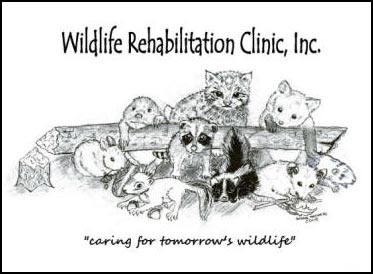In the case of an orphaned baby raccoon, or any injured raccoon, it's possible that a local licensed raccoon rehabilitator will help. These wonderful
people have made it their mission in life to help wildlife. It is not an easy job. They must meet special state licensing requirements. They must have
a habitiat in which to raise the animals. They must treat raccoons against rabies, distemper, and other diseases. They must feed the animals, and treat
injuries. At the end of the rehabilitation, they must say goodbye to the animals they have cared for and release them into the wild in an area that
helps promote survival.
If you have a baby or injured raccoon and wish to bring it to a rehabber, take great caution in handling the animal. I personally cannot advise you to
do so. Babies should be placed in a box and kept warm. An injured adult can be dangerous.
If you bring a raccoon to a rehabber, PLEASE donate to their operation. It is expensive to raise a raccoon! Vaccines, food, etc.
Will female raccoons abandon their young? Raccoons will sometimes abandon their young, especially if the mother is young herself. This is one of the dilemmas faced when trying to relocate a mother and her infants. When taken out of their home, even when together, the stress level can be too much for a new mother, and she may abandon her litter. If you have managed to catch a mother and her babies, you will need to visit the relocation site for a few days after release to make sure the mother has retrieved her litter. If not, the best thing you can do is take them to a wildlife rehabilitator. This is just one of the potential complications you can run into when trying to get a raccoon out of your home. It’s situations like this that make hiring a professional seem like the best way to go. Not only will an expert know how to find the babies in the attic with little trouble, they will be able to take responsibility for removing and then relocating the animals. The last thing a homeowner needs to be worrying about is what to do with orphaned kits. Ideally, you should get the babies before you trap the mother. If you leave them outside in a cage trap and she never comes back for them, you avoid the trouble of finding out they were abandoned somewhere miles away.
I personally do not accept donations. I just provide wildlife education. But if you do want to donate to some good wildlife rehabilitation organizations, or just learn more, visit these sites:

Wildlife Rehabilitation Clinic, St. Louis MO
Wildlife rehabilitation and raccoon roundworm - Wildlife rehabilitators are well-versed in the dangers of raccoon roundworm. Though lovers of all things wild, these experts know what type of protective gear needs to be used when handling a newly acquired raccoon. Once the animal has been quarantined for a period of time, the wildlife rehabilitator will deworm it with a pyrantel-based roundworm killing agent. This is the same active ingredient used to kill pinworms in people and other roundworms in companion animals. It takes at least two doses of the medication to ensure the raccoon is parasite-free. Just because roundworms are no longer an issue doesn’t mean the wildlife expert can throw caution to the wind. Raccoons can still carry leptospirosis and giardia, two illnesses that are more difficult to detect. Usually the quarantine period will generate signs of these diseases if they are present; however, they can manifest months after the raccoon has been released. For this reason, professionals with large animal population may have a veterinarian draw a blood sample to test for infectious disease.